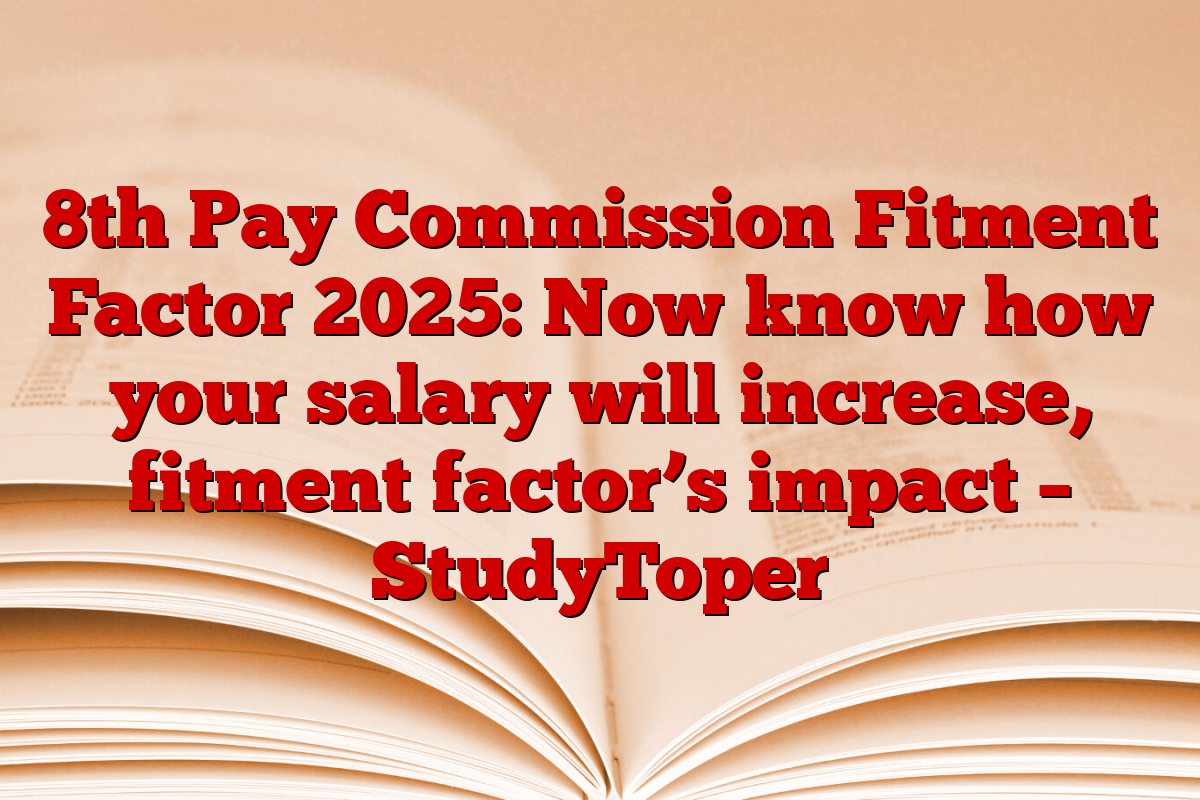The Government of India has announced 8th Pay Commission, which will work to improve the salaries, allowances and pension of central government employees and pensioners. The main objective of this commission is to reduce the influence of inflation and provide proper salary to the employees. In this article we will discuss the Fitment Factor and its effect, which is an important part of this Pay Commission.
The main objective of 8th pay commission
The 8th Pay Commission has been formed to amend the salary structure of central employees and pensioners. This commission is established every 10 years. Previous, i.e. 7th Pay Commission came into force in 2016, which increased the minimum wage from ₹ 7,000 to ₹ 18,000. Now the 8th Pay Commission is expected to increase the salary and allowances.
Brief description of 8th Pay Commission
| aspect | Description |
| Declaration date | 16 January 2025 |
| Effective date | 1 January 2026 |
| Fitment factor (estimated) | 2.86 (potential) |
| Previous fitment factor | 2.57 (7th Pay Commission) |
| Beneficiary | About 50 lakh employees and 65 lakh pensioners |
| key objectives | Improvement in salary, allowance and pension |
What is Fitment Factor?
The Fitment Factor is a multiplier that is used to modify the current original salary. This helps in calculating increased salary for government employees. For example:
- The 7th Pay Commission kept the Fitment Factor 2.57, which increased the minimum basic salary from ₹ 7,000 to ₹ 18,000.
- Now, the Fitment Factor for 8th Pay Commission is likely to be increased to 2.86.
Effect of fitment factor
If the Fitment Factor is fixed at 2.86, the minimum basic salary can increase from ₹ 18,000 to about ₹ 51,480. Below is a comparison table:
| Pay commission | Fitment factor | Minimum basic pay |
| 6th pay commission | 1.86 | ₹ 7,000 |
| 7th pay commission | 2.57 | ₹ 18,000 |
| 8th Pay Commission (Potential) | 2.86 | ₹ 51,480 |
Possibility of salary growth
Estimated salary increase
If the Fitment Factor is applied at different levels, then the following changes can occur in the salary:
- 1.92 Fitment Factor: The minimum salary can increase to ₹ 34,560.
- 2.08 Fitment Factor: The minimum salary can increase to ₹ 37,440.
- 2.86 Fitment Factor: The minimum salary can go up to ₹ 51,480.
other benefits
- Increase in dearness allowance.
- Improvement in travel allowance and other allowances.
- More profit for pensioners.
Comparison of previous and current fitment factor
Below is compared to the fitment factor of the last three pay commissions and their impact:
| Pay commission | Fitment factor | Minimum basic increment (%) |
| 6th pay commission | 1.86 | About 86% |
| 7th pay commission | 2.57 | About 157% |
| 8th Pay Commission (Potential) | 2.86 | About 186% |
When will the new pay commission be implemented?
Although the government has not yet given any concrete date, it is being speculated that the recommendations of 8th Pay Commission will be applicable from January 2026.
Possibility of delay
According to some reports, no special provision was made for this commission in Budget 2025. Therefore, its implementation may be slightly delayed.
Impact on central employees and pensioners
Effect on employees
- Heavy increase in minimum salary.
- Reorganization of dearness allowance and other allowances.
- More benefits to employees working in high positions.
Impact on pensioners
- Increase in basic pension.
- Family pension is also improved.
- Reorganization of dearness relief.
conclusion
The 8th Pay Commission may bring a major change for central government employees and pensioners. Its most important feature will be its Fitment Factor, which will determine the salary growth. However, this is only an estimated figures and the actual growth will be clear only after the official announcement by the government.
Disclaimer:
This article is written only for the purpose of providing information. All the details have not been confirmed by the government yet. Please wait for official announcements.
